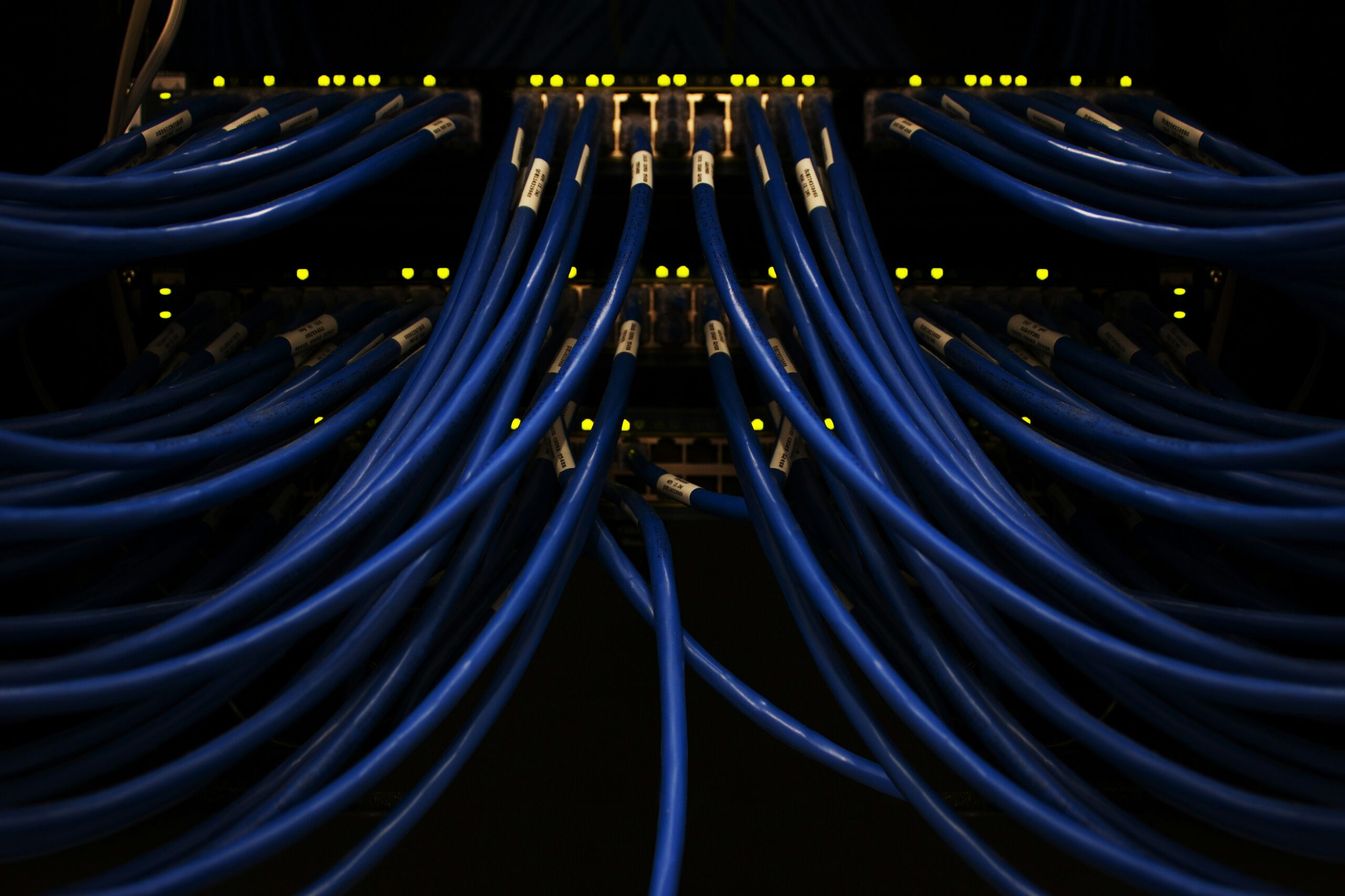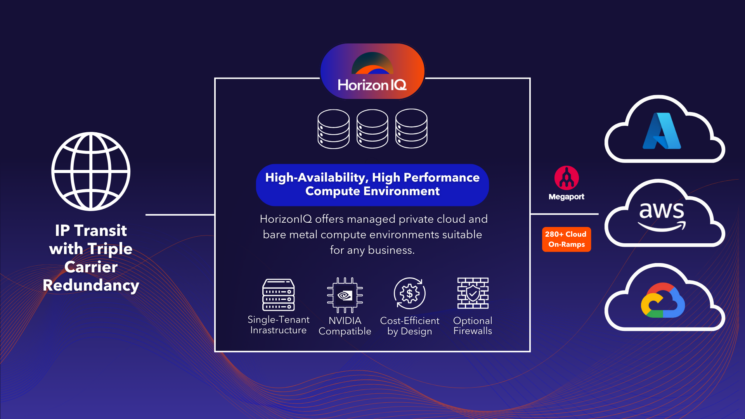
Network Connectivity: From Cross‑Connects to Cloud On‑Ramps with HorizonIQ Connect
Why Does Network Connectivity Matter More Than Ever?
With 98% of enterprises adopting a multicloud strategy and 83% planning to use multicloud interconnection, the ability to connect disparate cloud environments seamlessly has become a critical driver of infrastructure resilience.
Poor connectivity can lead to sluggish performance, skyrocketing costs, and security vulnerabilities that jeopardize operations.
For these reasons, we’re exploring why robust network connectivity is essential, the challenges businesses face, and how solutions like HorizonIQ Connect can transform your hybrid and multicloud ecosystem.

Why Is Network Connectivity Key to Multicloud Success?
Imagine a global e-commerce platform where AI analytics on Microsoft Azure struggle to sync with a customer-facing app on AWS, thereby delaying responses and frustrating users.
This scenario is all too common in multicloud environments. As businesses increasingly rely on distributed IT environments (e.g., running AI workloads on Google Cloud, databases on Azure, and frontends on AWS), robust connectivity is non-negotiable.
Connectivity is now a factor that determines whether businesses can deliver fast, secure, and cost-effective services. Poor connectivity leads to:
- Lost Revenue: Latency can disrupt user experiences, with studies showing that a 100ms delay in website load time can reduce conversion rates by 7%.
- Escalating Costs: Unoptimized data transfers, such as cloud egress fees, can inflate budgets by up to 30% annually.
- Security Risks: Public internet connections expose sensitive data.
What Are the Key Challenges in Network Connectivity?
Multicloud and hybrid cloud architectures offer flexibility, but they introduce significant complexity. Here are the primary connectivity challenges organizations face, and how to overcome them:
1. Latency and Performance Variability
Geographically dispersed cloud resources often lead to inconsistent performance. Real-time applications, such as video streaming or financial trading platforms, suffer when data travels across regions, with latency spikes impacting user satisfaction.
Solution: Deploy private, high-speed connections like cloud on-ramps or Content Delivery Networks (CDNs) to bring data closer to end-users. Edge computing can further reduce latency by processing data locally.
2. Cost Overruns and Hidden Fees
Cloud egress fees and redundant infrastructure can silently drain budgets. Organizations often face unpredictable costs when transferring data between clouds or maintaining underutilized resources.
Solution: Use direct interconnects to minimize egress fees. Centralized cost management tools provide visibility into usage and help organizations eliminate wasteful spending.
3. Security and Compliance Risks
Multicloud environments expand the attack surface. Public internet connections increase exposure to cyber threats, and varying compliance requirements (e.g., HIPAA, PCI-DSS) across providers complicate governance.
Solution: Implement private, encrypted connections and unified security policies via platforms like HorizonIQ Connect. Regular audits and compliance-ready providers ensure data protection across clouds.
4. Management Complexity
Each cloud provider has unique tools, APIs, and dashboards, making centralized management a nightmare.
Solution: Adopt multicloud management platforms that unify monitoring, orchestration, and automation. Tools like HorizonIQ’s Compass portal and Megaport’s API simplify oversight and streamline operations.
What Are the Options for Network Connectivity?
To address network connectivity challenges, businesses can choose from several connectivity models, each with distinct trade-offs. Here’s a detailed comparison:
- VPN Tunnels via Public Internet
- Pros: Quick to set up, cost-effective for small-scale or testing environments.
- Cons: Unreliable performance, high latency, and security risks over public networks.
- Best for: Temporary or low-stakes workloads with minimal data transfer needs.
- Data Center Cross-Connects
- Pros: Offers dedicated, low-latency connections (e.g., AWS Direct Connect, Azure ExpressRoute) with predictable costs.
- Cons: High upfront costs (CapEx) and limited flexibility for scaling across multiple clouds.
- Best for: Enterprises with stable, high-performance workloads in a single cloud.
- Cross-Cloud Interconnects
- Pros: Private peering between clouds (e.g., AWS ↔ GCP) reduces latency and egress fees while enhancing security.
- Cons: Static configurations and provider-specific limitations can hinder multicloud flexibility.
- Best for: Organizations with consistent workloads across two major cloud providers.
- Network as a Service (NaaS) with Cloud On-Ramps
- Pros: Software-defined, scalable, and secure connections with rapid provisioning.
- Cons: Dependency on provider coverage and potential learning curve for integration.
- Best for: Dynamic, multicloud environments with bursty workloads or global reach.
How Do Physical vs Virtual Cloud Cross‑Connects Compare?
- Physical (Layer 1): Dedicated links to a single cloud provider are reliable but costly and inflexible for multicloud setups.
- Virtual (Layer 2): A single port connects multiple clouds via virtualized networks, reducing costs and complexity. HorizonIQ’s Connect, paired with Megaport’s virtual routing, excels in this model.
Why Should You Choose HorizonIQ Connect for Network Connectivity?
HorizonIQ, in partnership with Megaport, offers a game-changing approach to multicloud and hybrid cloud connectivity. Our solutions address the challenges above with flexibility, performance, and cost-efficiency. Here’s why they stand out:
Key Features
- Rapid Provisioning: Spin up private connections to AWS, Azure, or GCP in minutes, not weeks, via Megaport’s Software Defined Network (SDN).
- Cost Savings: Reduce data transfer costs by up to 70% compared to public cloud providers, thanks to optimized on-ramps and pay-as-you-go pricing.
- Global Reach: With nine regions and access to over 280 cloud providers, HorizonIQ Connect provides low-latency connections worldwide.
- Security and Compliance: Certified for ISO-27001, PCI-DSS, HIPAA, and SOC 2, HorizonIQ Connect provides secure, compliant connections.
- Unified Management: HorizonIQ’s Compass portal and Megaport’s API offer a single interface for monitoring, scaling, and managing multicloud networks.
How Do I Choose the Right Network Connectivity Strategy?
Selecting the best approach depends on your business needs. Consider these questions:
- Performance Needs: Do you require ultra-low latency? Opt for private interconnects or NaaS with cloud on-ramps.
- Workload Dynamics: Are workloads bursty or seasonal? NaaS offers flexibility, while cross-connects suit static needs.
- Compliance Requirements: Handling sensitive data? Choose private links and providers with certifications like PCI-DSS.
- Budget Model: Prefer predictable costs? Dedicated cross-connects work well. Need flexibility? NaaS and pay-as-you-go models are ideal.
- Management Needs: Want centralized control? Platforms like HorizonIQ’s Compass and Megaport’s API simplify multicloud oversight.
Getting Started with HorizonIQ Connect
To build a future-proof multicloud network, follow these steps:
- Assess Needs: Evaluate workloads, performance goals, compliance requirements, and budget constraints. Choose from both fully managed and self-managed options.
- Choose a Model: Test VPNs for small-scale needs, cross-connects for stable workloads, or NaaS for dynamic multicloud setups.
- Partner with HorizonIQ: Engage with HorizonIQ to design a tailored connectivity solution, leveraging our Connect service and Megaport’s SDN.
- Pilot and Scale: Start with a pilot connecting one or two clouds to measure latency and costs, then expand to full production with redundancy and automation.
- Monitor and Optimize: Use HorizonIQ’s Compass portal and Megaport’s API for real-time insights and policy adjustments.
Build a Competitive Edge with HorizonIQ Connect
In a hybrid and multicloud world, connectivity isn’t just a technical necessity—it’s a strategic advantage. Poor connections can cripple innovation, inflate costs, and expose vulnerabilities, while optimized networks drive performance, savings, and growth.
HorizonIQ and Megaport deliver a powerful solution by combining rapid provisioning, global reach, and robust security to empower businesses.
Don’t let connectivity hold you back. Contact HorizonIQ to build a high-performance, secure multicloud network tailored to your needs.


